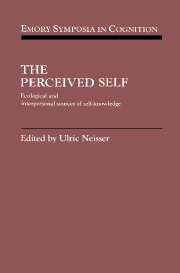Book contents
- Frontmatter
- Contents
- Preface
- List of contributors
- Part I Introduction
- Part II The concept of an ecological self
- 2 Ontogenesis of the perceived self
- 3 Body–environment coupling
- 4 A theory of representation-driven actions
- 5 The ecological self in historical context
- 6 Good intentions and dancing moments: Agency, freedom, and self-knowledge in dance
- 7 The primacy of the ecological self
- Part III The interpersonal self and its implications
- Author index
- Subject index
7 - The primacy of the ecological self
Published online by Cambridge University Press: 29 March 2010
- Frontmatter
- Contents
- Preface
- List of contributors
- Part I Introduction
- Part II The concept of an ecological self
- 2 Ontogenesis of the perceived self
- 3 Body–environment coupling
- 4 A theory of representation-driven actions
- 5 The ecological self in historical context
- 6 Good intentions and dancing moments: Agency, freedom, and self-knowledge in dance
- 7 The primacy of the ecological self
- Part III The interpersonal self and its implications
- Author index
- Subject index
Summary
The starting point for these reflections is Ulric Neisser's essay “Five Kinds of Self-Knowledge” (1988), which I wish to challenge or, at any rate, to read with an emphasis differing from its author's.
During the semester preceding the conference for which this essay was prepared, E. J. Gibson conducted a seminar on the ontogenesis of the perceived self. At the head of her outline for the seminar, she placed a statement from J.J. Gibson: “To perceive the world is to coperceive oneself” (1979, p. 141). Accepting this maxim, I want also to reverse it: To perceive oneself is, except in very peculiar circumstances, to coperceive the world. As J.J. Gibson put it some pages earlier than the statement just cited, “We were created by the world we live in.” Thus, to be aware of ourselves, I would say, is to be aware not only of a product of that world but also of aspects of the world that bear on its production.
Self-knowledge is fundamentally and inalienably ecological, and so is the object of such knowledge. Of course, as Neisser argues, there are a number of paths to self-knowledge: If I want to know who I am, I can consult my children, my colleagues, my tax accountant, my bathroom scale, my birth certificate, even, to a degree, my memory images or my aches and pains, and so on.
- Type
- Chapter
- Information
- The Perceived SelfEcological and Interpersonal Sources of Self Knowledge, pp. 112 - 118Publisher: Cambridge University PressPrint publication year: 1994



